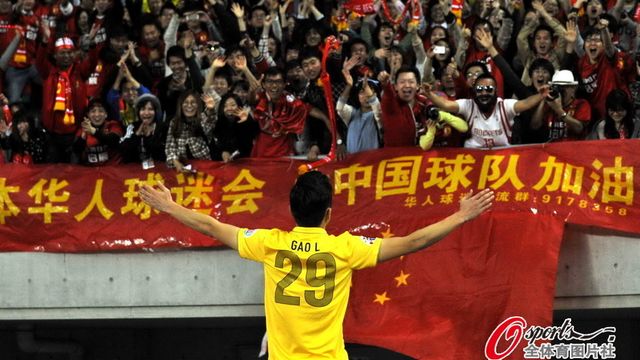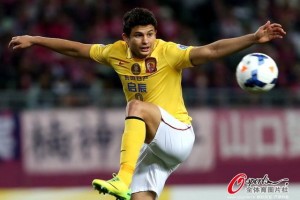After an unsteady stumble through Group G, ACL holders Guangzhou Evergrande kicked off the knockout stage of their title defence by spectacularly eviscerating Cerezo Osaka on their own turf. One point in three away group games may have given potential opponents hope that fragility on the road was developing, but the five goal haul here, their biggest in the competition since their continental debut at Jeonbuk Motors, will have put an end to any of that.
AFC Champions League Round of 16 First Leg
Cerezo Osaka 1
Aria Jasuru Hasegawa 30′
Guangzhou Evergrande 5
Muriqui 22′, 84′, Elkeson 34′ (pen.), 37′, Gao Lin 78′
Though it was these sides’ first encounter, Osaka had already lost at home to Chinese opposition this year, going down 3-1 to Shandong Luneng in March. In Jinan a fortnight ago, Diego Forlan and young international striker Yoichiro Kakitani both netted to avenge the earlier defeat and seal progression to the next stage, but the whole team will need to put in performances of a lifetime at Tianhe next Tuesday to save this tie.
That’s not to say Cerezo played particularly badly, and certainly not in an end-to-end opening half hour where they gave almost as good as they got, with Forlan misfiring a couple of times but also seeing Kim Young-Gwon booked for bundling him over. The visitors (though you wouldn’t have guessed it from the crowd noises) had more of and the better of the chances though, with lots of well-worked interplay between the front three, and indeed the three behind them.
The deadlock was broken midway through the half after a one-two with Diamanti sent Muriqui through on Kim Jin-Hyeon, the Brazilian demonstrating his easy confidence of old to finish past the keeper. Forlan was instrumental in setting up Hasegawa’s equaliser with a deft run and cross from the right on the half hour, but parity wasn’t to last long.
Within seven minutes the home side were two behind to an Elkeson brace, the first a penalty he both earned (or rather was gifted by the cautioned Yuta Someya) and scored, and the second from a delightfully precise flick of the head onto Diamanti’s equally impressive free kick from deep. Liao Lisheng’s low drive went close soon after, and Cerezo’s manager Ranko Popovic must have been happy just to get to the break without taking additional damage.
Home rearrangements were extensive, with two defenders being replaced by a midfielder and a forward. However when Osaka’s players weren’t misplacing passes they got little change from a mean Evergrande defence, and as Forlan and cohorts started to run out of steam and optimism (35 in a fortnight’s time, the Uruguayan legend probably hadn’t been expecting this kind of runaround when he moved to Japan), it became more a matter of when than if the champions would extend their lead.
All three foreign forwards were excellent, even if official man-of-the-match Elkeson had a quiet second half before being subbed off for Gao Lin. Diamanti was constantly involved and should have had a goal to go with his two assists when he struck the woodwork right before the final whistle, though there were still moments of pointless greed to go with the improved work-rate (perhaps spurred on by his omission from the recent Italian national squad?)
But it was Muriqui, his early season troubles left far behind, who was the real star of the show. He set up Gao Lin for his side’s fourth in the 78th minute (after which the watching Japan national team manager Alberto Zaccheroni decided he’d had enough and left) and the Henan man returned the favour six minutes later, crossing for last year’s competition MVP to dive at the ball and score a goal that ended his participation in the game; having slid head-first into the right post, he had to be replaced by Rong Hao. He seemed okay afterwards though.
It could have easily been more than five; besides Diamanti’s miss, Kim had to save sharply from substitute Huang Bowen before time ran out, and there were a number of other decent chances throughout. Cerezo can rue some wasted opportunities, but Guangzhou were simply in terrifying form, and while this J-League side are hardly a litmus test (this being only their second time in the competition and their domestic campaign not having started particularly well), this display showed – if it needed showing – that the trophy will not be easily prised from the Cantonese grasp.
Cerezo Osaka: 21 Kim Jin-Hyeon; 14 Yusuke Maruhashi, 23 Tatsuya Yamashita, 3 Yuta Someya, 4 Kota Fujimoto; 5 Aria Jasuru Hasegawa, 30 Gojko Kačar, 2 Takahiro Ogihara; 8 Yoichiro Kakitani, 6 Hotaru Yamaguchi, 10 Diego Forlán
Subs: 13 Takumi Minamino (for 4 Kota Fujimoto 46’), 17 Noriyuki Sakemoto (for 3 Yuta Someya 46’), 20 Kenyu Sugimoto (for 2 Takahiro Ogihara 63’)
Guangzhou Evergrande: 19 Zeng Cheng; 32 Sun Xiang, 28 Kim Young-Gwon, 6 Feng Xiaoting, 5 Zhang Linpeng; 2 Liao Lisheng, 10 Zheng Zhi, 37 Zhao Xuri; 11 Muriqui, 15 Alessandro Diamanti, 9 Elkeson
Subs: 29 Gao Lin (for 9 Elkeson 73’), 16 Huang Bowen (for 37 Zhao Xuri 76’), 33 Rong Hao (for 11 Muriqui 73’)


A truly frightening display of quality Asian football.
Well I hope the assembled glory-supporter nationalists in the picture enjoyed completely relying on their *non-Chinese players* to rub Japan’s face in it. Bet none of them would have shown up to support the motherland here (or in Australia for that matter) if it was Guizhou Renhe!
A big Chinese flag, a banner imploring the ‘Zhongguo’ team to jiayou, supporters from the ‘Japan Chinese football fans club’, give this event quite a nationalist twist, but the fact of the matter is, Japanese clubs are significantly more reliant on home-grown talent* than their Chinese equivalents, and hence their superiority at a national level will persist, regardless of how many China-based foreign mercenaries single-handedly produce national face-gaining results like this one.
(*Just check out the number of Japanese players among the J-league top scorers compared with Chinese players the CSL.)
You mean the Chinese side that lost 5-1 at home to an experimental young Thai team last year was crap!!? That the national squad who barely scraped into the Asian Cup on the last day of qualification (via goals from Thailand again, funnily enough) won’t be as good as Japan’s in it!!?
Japan started developing their sports in a modern direction far earlier than China, whose football is arguably still mired in the dark ages in many ways, so of course their superiority will persist for some time yet. This happened largely because of Japan’s much quicker post-WW2 stabilisation and economic development (funny how well the losers did out of that war), though there are other factors.
Unsurprisingly, most Chinese people don’t much like being regularly beaten at football by those from a (smaller) land that invaded theirs in living memory. Of course they’re going to leap on any excuse to yell triumphantly at the old enemy, even if it’s really just an expression of financial superiority.
But hey, thanks for coming on and stating the bloody obvious anyway.
The surprising/disappointing thing is that Chinese football, once it decided to take part in international competitions in the 70s, was more or less even, arguably even better than Japan up until the early 90s, when the two sides started going down extremely divergent paths…
Away attendance at any Chinese ACL match is good, no matter where it is (there was even a decent crowd in Tashkent for Guoan’s match last season) because the local embassy/consulate gets the Chinese student groups in the area to promote the match, gives out free tickets, etc. Evergrande get more than most because the club typically also pops for buses and meals, but even if it was Guizhou, there’d be a couple hundred Chinese fans (and “fans”) there with flags and banners.
I think there’s many things to say about this game. The most relevant of course being congratulations to Guangzhou for an excellent victory.